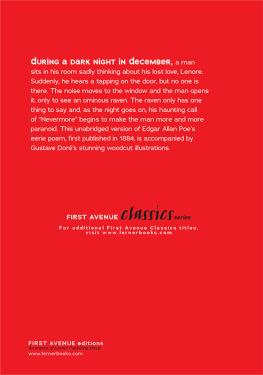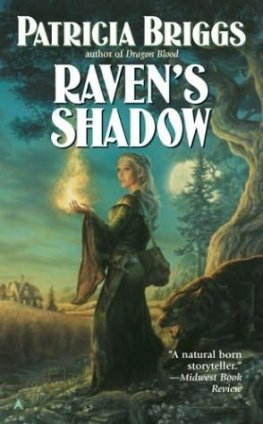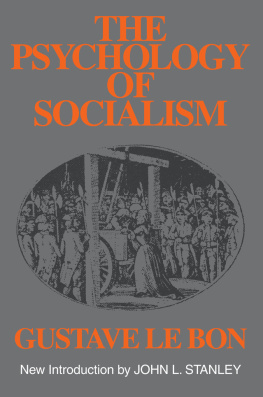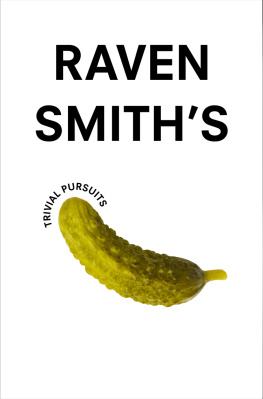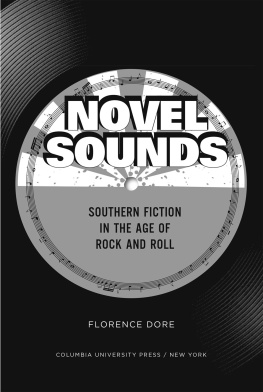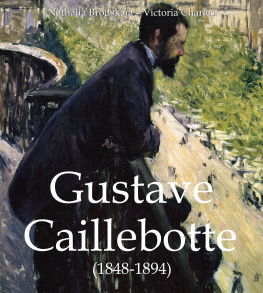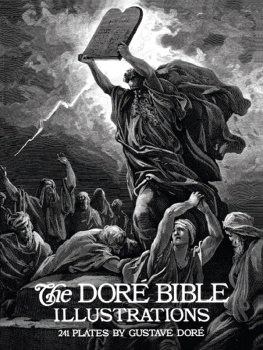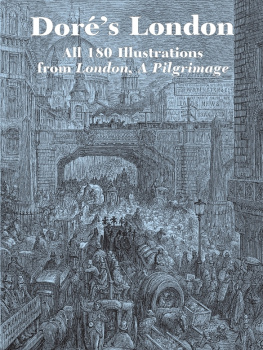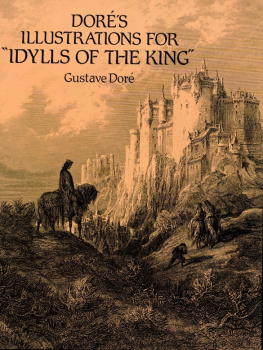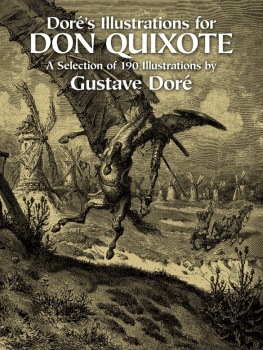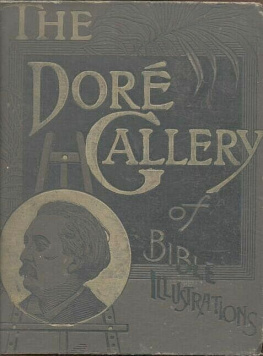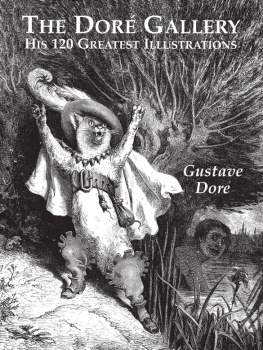Doré Gustave - The Raven
Here you can read online Doré Gustave - The Raven full text of the book (entire story) in english for free. Download pdf and epub, get meaning, cover and reviews about this ebook. publisher: Lerner Publishing Group, genre: Detective and thriller. Description of the work, (preface) as well as reviews are available. Best literature library LitArk.com created for fans of good reading and offers a wide selection of genres:
Romance novel
Science fiction
Adventure
Detective
Science
History
Home and family
Prose
Art
Politics
Computer
Non-fiction
Religion
Business
Children
Humor
Choose a favorite category and find really read worthwhile books. Enjoy immersion in the world of imagination, feel the emotions of the characters or learn something new for yourself, make an fascinating discovery.
- Book:The Raven
- Author:
- Publisher:Lerner Publishing Group
- Genre:
- Rating:4 / 5
- Favourites:Add to favourites
- Your mark:
- 80
- 1
- 2
- 3
- 4
- 5
The Raven: summary, description and annotation
We offer to read an annotation, description, summary or preface (depends on what the author of the book "The Raven" wrote himself). If you haven't found the necessary information about the book — write in the comments, we will try to find it.
The Raven — read online for free the complete book (whole text) full work
Below is the text of the book, divided by pages. System saving the place of the last page read, allows you to conveniently read the book "The Raven" online for free, without having to search again every time where you left off. Put a bookmark, and you can go to the page where you finished reading at any time.
Font size:
Interval:
Bookmark:



A man mourning his lost love hears tapping on the door, but no one is there. The noise moves to the window and there the man finds an ominous raven, with a haunting call of Nevermore. This First Avenue Classics version of Edgar Allan Poes The Raven, was first published in 1884, and is in the public domain. The text has been put into a new design to make this book appealing and easier to read in both digital and paperback formats. This book also features original woodcut illustrations by Gustave Dor, which were published in the 1884 edition. The eBook contains a hyperlinked Table of Contents for navigation. The First Avenue Classics version is unabridged and has been proofed for formatting errors. Errors and alternate spellings found in the original book have not been changed. When necessary, artwork was modified to fit the format of this edition.
Copyright 2014 by Lerner Publishing Group, Inc.
All rights reserved. International copyright secured. No part of this book may be reproduced, stored in a retrieval system, or transmitted in any form or by any meanselectronic, mechanical, photocopying, recording, or otherwisewithout the prior written permission of Lerner Publishing Group, Inc.
First Avenue Editions
A division of Lerner Publishing Group, Inc.
241 First Avenue North
Minneapolis, MN 55401 USA
For reading levels and more information, look up this title at www.lernerbooks.com.
In fixed layout formats of this book, the main body text is set in Janson Text LT Std 55 Roman 11/15.
Typeface provided by Adobe Systems.
Library of Congress Cataloging-in-Publication Data
The Cataloging-in-Publication Data for The Raven is on file at the Library of Congress.
ISBN: 9781467746014 (PB)
ISBN: 9781467746151 (EB)
Manufactured in the United States of America
1 DOC 2/1/14
eISBN: 978-1-46774-615-1 (pdf)
eISBN: 978-1-46776-850-4 (ePub)
eISBN: 978-1-46775-661-7 (mobi)

ANANKE
COMMENT ON THE POEM
The secret of a poem, no less than a jests prosperity, lies in the ear of him that hears it. Yield to its spell, accept the poets mood: this, after all, is what the sages answer when you ask them of its value. Even though the poet himself, in his other mood, tell you that his art is but sleight of hand, his food enchanters food, and offer to show you the trick of it,believe him not. Wait for his prophetic hour; then give yourself to his passion, his joy or pain. We are in Loves hand to-day! sings Gautier, in Swinburnes buoyant paraphrase,and from morn to sunset we are wafted on the violent sea: there is but one love, one May, one flowery strand. Love is eternal, all else unreal and put aside. The vision has an end, the scene changes; but we have gained something, the memory of a charm. As many poets, so many charms. There is the charm of Evanescence, that which lends to supreme beauty and grace an aureole of Pathos. Share with Landor his one night of memories and of sighs for Rose Aylmer, and you have this to the full.
And now take the hand of a new-world minstrel, strayed from some proper habitat to that rude and dissonant America which, as Baudelaire saw, was for Poe only a vast prison through which he ran, hither and thither, with the feverish agitation of a being created to breathe in a purer world, and where his interior life, spiritual as a poet, spiritual even as a drunkard, was but one perpetual effort to escape the influence of this antipathetical atmosphere. Clasp the sensitive hand of a troubled singer dreeing thus his weird, and share with him the clime in which he found,never throughout the day, always in the night,if not the Atlantis whence he had wandered, at least a place of refuge from the bounds in which by day he was immured.
To one land only he has power to lead you, and for one night only can you share his dream. A tract of neither Earth nor Heaven: No-mans-land, out of Space, out of Time. Here are the perturbed ones, through whose eyes, like those of the Cenci, the soul finds windows though the mind is dazed; here spirits, groping for the path which leads to Eternity, are halted and delayed. It is the limbo of planetary souls, wherein are all moonlight uncertainties, all lost loves and illusions. Here some are fixed in trance, the only respite attainable; others
move fantastically
To a discordant melody:
while everywhere are
Sheeted Memories of the Past
Shrouded forms that start and sigh
As they pass the wanderer by.
Such is the land, and for one night we enter it,a night of astral phases and recurrent chimes. Its monodies are twelve poems, whose music strives to change yet ever is the same. One by one they sound, like the chiming of the brazen and ebony clock, in The Masque of the Red Death, which made the waltzers pause with disconcert and tremulousness and meditation, as often as the hour came round.
Of all these mystical cadences, the plaint of The Raven, vibrating through the portal, chiefly has impressed the outer world. What things go to the making of a poem,and how true in this, as in most else, that race which named its bards the makers? A work is called out of the void. Where there was nothing, it remains,a new creation, part of the treasure of mankind. And a few exceptional lyrics, more than others that are equally creative, compel us to think anew how bravely the poets pen turns things unknown
to shapes, and gives to airy nothing
A local habitation, and a name.
Each seems without a prototype, yet all fascinate us with elements wrested from the shadow of the Supernatural. Now the highest imagination is concerned about the soul of things; it may or may not inspire the Fantasy that peoples with images the interlunar vague. Still, one of these lyrics, in its smaller way, affects us with a sense of uniqueness, as surely as the sublimer works of a supernatural cast,Marlowes Faustus, the Faust of Goethe, Manfred, or even those ethereal masterpieces, The Tempest and A Midsummer Nights Dream. More than one, while otherwise unique, has some burden or refrain which haunts the memory,once heard, never forgotten, like the tone of a rarely used but distinctive organ-stop. Notable among them is Brgers Lenore, that ghostly and resonant ballad, the lure and foil of the translators. Few will deny that Coleridges wondrous Rime of the Ancient Mariner stands at their very head. Le Juif-Errant would have claims, had Beranger been a greater poet; and, but for their remoteness from popular sympathy, The Lady of Shalott and The Blessed Damozel might be added to the list. It was given to Edgar Allan Poe to produce two lyrics, The Bells and The Raven, each of which, although perhaps of less beauty than those of Tennyson and Rossetti, is a unique. Ulalume, while equally strange and imaginative, has not the universal quality that is a portion of our test.
The Raven in sheer poetical constituents falls below such pieces as The Haunted Palace, The City in the Sea, The Sleeper, and Israfel. The whole of it would be exchanged, I suspect, by readers of a fastidious cast, for such passages as these:
Around, by lifting winds forgot,
Resignedly beneath the sky
The melancholy waters lie.
Next pageFont size:
Interval:
Bookmark:
Similar books «The Raven»
Look at similar books to The Raven. We have selected literature similar in name and meaning in the hope of providing readers with more options to find new, interesting, not yet read works.
Discussion, reviews of the book The Raven and just readers' own opinions. Leave your comments, write what you think about the work, its meaning or the main characters. Specify what exactly you liked and what you didn't like, and why you think so.

